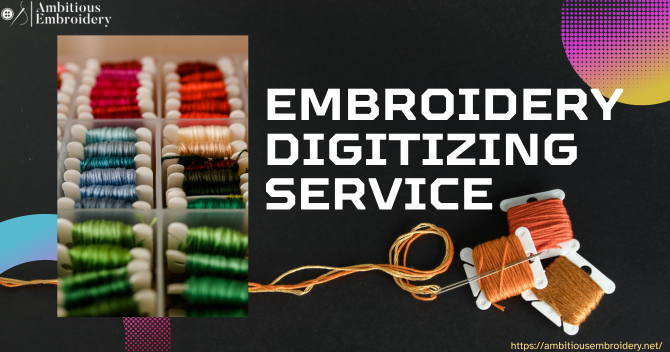In order to limit their influence on the environment, sustainable embroidery digitizing services use eco-friendly methods and materials. Through the course of the embroidery process, these services prioritize waste reduction, the use of sustainable materials, and energy efficiency optimization. A few essential components of eco-friendly embroidery digitizing services are as follows:
Eco-Friendly Threads
Organic cotton threads produced from cotton farmed without the use of artificial fertilizers or pesticides are among the eco-friendly threads used in sustainable embroidery digitizing services. Recycled threads can be made from leftover fabric scraps or plastic bottles, offering an additional choice. Further lessening the environmental effect, these services employ natural dyes made from plants and other natural sources rather than chemical dyes.
Water-Based Inks
Using water-based inks is essential to digitizing embroidery sustainably. Compared to solvent-based inks, these inks have fewer negative environmental effects and are devoid of toxic chemicals and pollutants. By switching to non-toxic, water-based inks, embroidery projects are leaving a less environmental impact and ensuring safer products for both manufacturers and customers.
Energy-Efficient Equipment
When it comes to sustainable embroidery digitizing services, energy efficiency is crucial. These services can drastically cut back on their energy usage by using the newest embroidery machines, which use less electricity and last longer. Energy-saving techniques can also be implemented in industrial facilities to further optimize energy use and make the process more environmentally friendly overall.
Waste Reduction
For sustainable embroidery digitizing services, waste reduction is a primary goal. It is imperative to design digitization patterns and procedures that reduce thread waste. In addition, recycling unused materials and reusing components whenever feasible help to lower the total amount of waste produced during production, supporting a more sustainable strategy.
Sustainable Production Practices
Eco-friendly digitizing services for embroidery require sustainable production methods. Lean manufacturing strategies reduce waste and increase efficiency, and sourcing resources locally lowers transportation-related emissions. By using these procedures, the production process is made to be both environmentally friendly and efficient.
Conclusion
Many businesses are excellent examples of sustainable embroidery digitizing services. Green Embroidery Solutions prioritizes the use of energy-efficient technology, eco-friendly inks, and organic and recycled threads. Sustainable techniques, such as waste minimization, sourcing materials locally, and moral labor standards, are the main priorities of EcoStitch Digitizing. In order to produce effective, environmentally responsible designs, Sustainable Threads Digitizing uses natural dyes, sustainable materials, and cutting-edge software. These businesses provide evidence of the viability and advantages of incorporating sustainability into embroidery digitizing services.

